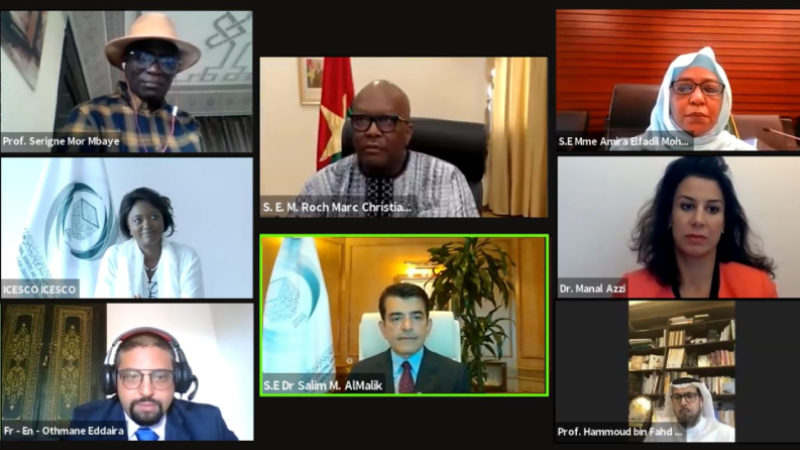
ICESCO Virtual Meeting call for addressing domestic violence due to COVID-19 Pandemic

25 June 2020
**Burkina Faso President: Providing psychological and social support to vulnerable categories is a necessity
**ICESCO Director-General: Healthcare must also include issues of psychological and mental health
**African Union Commissioner: There is an urgent need for new measurements
The keynote speakers at the high-level virtual meeting held today by the Islamic World Educational, Scientific and Cultural Organization (ICESCO) reaffirmed the importance of providing psychological and mental healthcare to citizens and fostering their resilience in times of crises and vulnerability, namely amid the COVID-19 pandemic which has had tremendous repercussions on societies around the globe.
At the outset of the meeting, which saw the attendance of H.E. Mr. Roch Marc Christian Kaboré, President of Burkina Faso, as a guest of honor, Dr. Salim M. AlMalik, ICESCO Director-General, hailed the keenness of the President to participate in the meeting. He affirmed that ICESCO is proud to have the President of a Member State attend one of its virtual meetings, which demonstrates the outstanding role played by ICESCO to accomplish its new vision.
Dr. AlMalik lauded the efforts made by Burkina Faso in addressing the repercussions associated with the pandemic and containing its contagion.
In his address, H.E. Mr. Kaboré noted that during the COVID-19 Pandemic, plethoric forms of violence have surged due to the pandemic and other crises, hence the need to reflect on ways to provide psychosocial support to the vulnerable categories in particular. In this regard, he cited several programmes implemented by his country to support the autonomy and empowerment of these categories.
Moreover, Burkina Faso’s President commended ICESCO’s action and initiatives for helping African countries mitigate the impact of COVID-19 by providing food, personal hygiene products, protective equipment, and support to the efforts of women and girls empowerment. Likewise, he underlined his country’s commitment to boost and sustain relations and action with the Organization.
For his part, Dr. AlMalik stated that the COVID-19 pandemic had a profound psychological impact on humanity as a whole. In this vein, he highlighted that the lockdown measures had constrained social movement, which is critical to ensure people’s livelihoods, causing adverse effects on the mental and psychological health of individuals.
Adding to this situation is the recently gathered data on domestic violence complaints, which tripled since the beginning of lockdowns.
By the same token, ICESCO Director-General stressed the need for including psychological and mental health issues in the field of healthcare, through providing hotline services and qualified healthcare staff to address domestic violence and curb suicide rates, and working to uproot causes through a strong safety net for family heads and people living in vulnerable conditions.
Ms. Amira El-Fadil Mohammad El-Fadil, African Union Commissioner for Social Affairs, delivered an address wherein she stated that the pandemic had affected the way we live and behave with others and on our children’s development. To deal with this issue, Ms. El-Fadil underlined the need for accurate measurements to assess and give attention to public and mental health as growing pressure on families has led to rising violence, thus the need for greater awareness. She later reviewed the African Union’s measures undertaken to this effect.
The Commissioner thanked ICESCO for inviting the African Union to this important meeting while reaffirming that there will be large-scale cooperation between the African Union and ICESCO, a statement which was welcomed by ICESCO Director-General who underlined that Africa is a topmost priority for the Organization.




